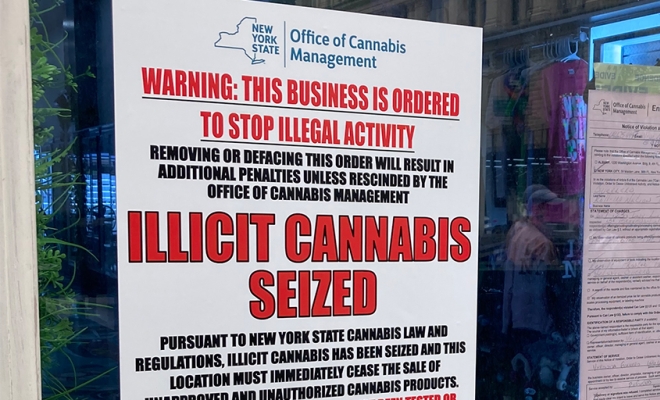New York’s long-promised crackdown on unregulated cannabis sales is coming into focus. With a $237 billion state budget finalized April 20, the Office of Cannabis Management (OCM) as well as local authorities now have “padlocking authority” over dispensaries selling without a license.
In some cases, if an inspection shows that storefront poses an “imminent threat to health and safety” law enforcement can padlock it on the spot. The city is then expected to schedule a hearing within five days. Tampering with the padlock will be punishable as a misdemeanor.
“Imminent threat to health and safety” includes activities like violent conduct, having unlicensed firearms on the premises, selling to minors or selling “products not tested or labeled” in accordance with state law. If an inspection doesn’t show that an unlicensed shop meets padlocking criteria, authorities can issue a warning to cease operations, or else get padlocked upon re-inspection.
“You know what’s hard to factor in your business model, having your front door padlocked for up to a year,” Governor Kathy Hochul (D) said during a press conference April 19. “You could appeal the fine. You’ll get your due process. But while the due process plays out, the padlock stays on.”
Hochul said that those who sell cannabis without a license “make a mockery of our laws.” The state has issued around $25 million in fines, but only a small fraction of that has been collected.
The new budget gives landlords more power to evict tenants for “customarily or habitually” selling without a license. It also imposes hefty fines if they don’t—$50,000 in New York City, or five times the rent in the rest of the state.
New York legalized adult-use cannabis in March 2021, but the first licensed dispensary didn’t open until December 2023. There are currently 100 licensed dispensaries. One state legislator has estimated there are currently 36,000 that are unlicensed.
The disparity between the numbers of licensed and unlicensed shops comes from the OCM licensing process. Initially, licensing prioritized social equity applicants who had been criminalized as a result of marijuana prohibition.
“The second round was open licensing—the only qualification you needed was real estate in order to be prioritized,” Wei Hu, an attorney who specializes in New York cannabis law and has financial stake in two licensed shops, told Filter. “I think a lot of political consideration was given to the [unlicensed] shops to give them a chance.”
Hu was “ecstatic” about the new measures to curb unlicensed sales. He also believes the state budget’s provision repealing the potency tax on wholesale cannabis in favor of a flat tax, will allow licensed businesses lower their prices.
He predicted that the state could have 400 licensed shops by the end of 2024.
Ramos urged people to to choose dispensaries operated by people formerly incarcerated.
Emily Ramos, founder and worker-owner of New York City marijuana cooperative ¡High Mi Madre!, said that unlicensed shops undercut a movement that’s intended for equity and restorative justice—not just a business opportunity for those unimpacted by criminalization. Her father was incarcerated for five years under marijuana prohibition.
“I fought for no re-criminalization of the underground market,” Ramos told Filter. “I wanted to make sure legacy operators were not retargeted in the licensed market, because I knew there would be many barriers to entry. Unfortunately many of the unlicensed shops in NYC, they’re not being run by legacy operators.”
Ramos urged consumers to to choose dispensaries operated by people formerly incarcerated.
From OCM, she’d like to see more flexibility. Expanding market regulations would allow licensed dispensaries to offer more social activities, like samplings and consumption lounges.
“For folks to try the product and be able to experience it, so they can see what they’re purchasing,” she said. “That would give [licensed operators] an opportunity to compete with unlicensed shops.”
Photograph via New York State Governor Kathy Hochul





Show Comments